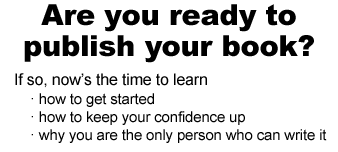Staring at a blank sheet of paper or Word document as you start an article, a blog post or your book is a scary thing. It stops the flow of creativity in even the most  talented writer. As for newcomers to the process, it can kill the dream at the start.
talented writer. As for newcomers to the process, it can kill the dream at the start.
Published writers, editors and publishers offer much advice about what you should do before you write your book. Most say you should create an outline or put pressure on yourself by announcing your plan to the world.
One thing that is extremely helpful to authors as they are writing their book is market research. You may have heard this term used as it relates to consumer research for marketing services and products, but it is also a very relevant practice for writers, too!
One of the best kind of “market research” is studying an author you admire.
There are three good reasons for this.
1. Inspiration
The mere fact that a favorite author has successfully shared her ideas in print is encouraging, especially at the start when your first words seem out of reach. Observing the author use words you can understand to unfold concepts before your very eyes will give you encouragement and often call forth your ideas that until now were too shy to reveal themselves.
2. Guidance
It is very instructive to turn an analytical eye to the work of an admired author or even the top authors in your genre, whether you admire them or not. You can learn about writing, structuring and publishing all in one place.
First, pay attention to how you approach the book as a reader: check out the title, author’s name, quick scan of front cover, flip over to back cover looking for proof that this book will keep the promise of its title and solve your problem or fill your need.
Second, go inside the book to see how the author delivers on his promise. How does he begin, develop and end the chapters? Is the book light-hearted, humorous or serious, with lessons and activities? Are there quotes, stories, illustrations, and if so, do they add to the message? Are there examples to make key points clear or does the author pose questions and leave you to reflect?
3. Direction
After you have read, examined and analyzed the book, you will begin to see gaps in what and how the author wrote his book and how you want to write yours.
You will notice omissions, ideas she didn’t cover or information glazed over that you’d like to explain in more depth in your book.
You will begin to see missing evidence you would set forth to support ideas in your book that somehow the author in question neglected.
In this phase you will begin to see your book emerge as distinctive. Even though it may be on the same or similar topic or style and isn’t even written yet, you will begin to see the gap your book will fill in the literature.
You will be able to visualize the books currently on the bookstore shelf moving closer together making just enough space on the shelf for your upcoming book to join them.
There are two more very practical reasons to study another author or authors in your genre:
- You will be able to return to them when your confidence wanes along the way (and it will).
- If you plan to approach a literary agent or submit directly to a traditional publisher, this will be a required part of your proposal, without which they will not even consider your manuscript.
Using these techniques and tips will keep you moving forward on your path to writing your articles, blog posts or your own book. Start putting them into action today!











